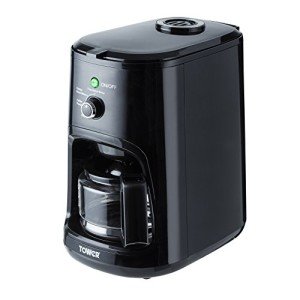What Is Coffee Appliances's History? History Of Coffee Appliances
A Comprehensive Guide to Coffee Appliances: Elevate Your Brewing Experience
Coffee, often dubbed the elixir of life, has captivated our senses and boosted our mornings for centuries. In today's busy world, a plethora of coffee appliances have actually emerged, each created to cater to varied brewing preferences and way of lives. This article checks out the various kinds of coffee appliances readily available and their features, advantages, and the science behind crafting the perfect cup of coffee.
Types of Coffee Appliances
The landscape of coffee brewing devices is huge and specialized. The following table provides an overview of the most popular coffee appliances and their essential characteristics:
Coffee Appliance
Description
Secret Features
Drip Coffee Maker
Immediately brews coffee by leaking hot water.
Programmable settings, integrated mill, carafe size options.
Espresso Machine
Brews strong coffee utilizing high pressure.
Steam wand for frothing, pressure gauges, programmable shots.
Single Serve Brewer
Brews a single cup of coffee rapidly.
Pod-based systems, range of tastes, very little clean-up.
French Press
A manual brewing gadget that requires steeping.
Basic style, customizable developing time, full-bodied taste.
Pour-Over Brewer
Handbook developing method that enables control over brew.
Requires particular grind size, slower process, rich flavor profile.
Percolator
Cycles boiling water through coffee premises.
Special developing process, can be utilized on a stovetop or electric.
Cold Brew Maker
Soaks coffee premises in cold water.
Smooth taste, low level of acidity, ideal for iced coffee enthusiasts.
Turkish Coffee Pot
A little pot used for developing carefully ground coffee.
Traditional approach, thick coffee with a rich texture.
Functions to Consider When Choosing a Coffee Appliance
When selecting a coffee home appliance, numerous aspects can influence one's decision, consisting of benefit, brewing design, and personal taste. The following list highlights essential functions to consider:
Brewing Capacity:
- Determining whether you mostly brew for yourself or a crowd can direct your option. Some appliances offer single-serve options while others can brew numerous cups at once.
Developing Method:
- Different developing approaches (e.g., drip, espresso, pour-over) affect flavor and caffeine levels. Understand your preferred approaches to match the right device.
Reduce of Use:
- Consider how much effort you desire to purchase brewing. Some machines have actually advanced functions like programmable settings, while others require manual intervention.
Size and Portability:
- Assess your kitchen space and figure out if you require a compact machine or if you have room for larger appliances.
Budget:
- Coffee appliances range from affordable to high-end luxury designs. Determine your spending plan to discover a device that balances quality and rate.
Upkeep:
- Different machines require differing levels of upkeep. Think about how easy it is to clean and maintain your selected home appliance.
Brewing Science: The Art of Creating Great Coffee
The experience of brewing coffee exceeds simply utilizing a machine; it involves an interaction of various scientific concepts. Here are some vital aspects that impact the last cup:
Coffee Beans: The option of beans, their origin, roast level, and freshness considerably affect the taste. High-quality, freshly roasted beans are important for the best flavor.
Grind Size: Different developing approaches require particular grind sizes. For example, espresso requires great grounds, while French press utilizes coarser ones. The grind size impacts extraction time and the richness of taste.
Water Temperature: Brewing coffee at ideal temperature levels (normally in between 195 ° F to 205 ° F) is crucial for efficient extraction. Too hot or too cold water can cause over-extraction or under-extraction.
Brew Time: The time coffee grounds interact with water influences the taste. While espresso takes about 25-30 seconds, a French press might need 4 minutes or longer.
Frequently Asked Questions About Coffee Appliances
Q1: What is the very best coffee device for novices?
A1: Drip coffee makers are ideal for beginners due to their ease of usage and capability to brew numerous cups concurrently. Single-serve brewers are also convenient for those who prefer a fast cup.
Q2: Can I use regular ground coffee in a single-serve machine?
A2: Many single-serve machines work specifically with coffee pods. Nevertheless, some models include a multiple-use filter that allows the use of routine ground coffee.
Q3: Is a grinder required for my coffee appliance?
A3: While not strictly essential, an integrated grinder or separate mill can enhance your coffee experience by permitting you to use fresh, entire coffee beans.
Q4: How typically should I clean my coffee device?
A4: Regular cleaning is important for preserving taste and machine longevity. Standards differ, but typically, it's great to clean appliances weekly or after every couple of usages.
Q5: How do I guarantee I'm utilizing the ideal water for brewing?
A5: Use filtered or mineral water for developing coffee. Tap Affordable Coffee Machines can affect taste due to chlorine or other impurities.
The world of coffee appliances offers a variety of options customized to individual choices, way of lives, and spending plans. By understanding the types of appliances offered and their functions, along with the brewing science behind crafting an ideal cup, coffee lovers can make informed choices that improve their brewing experience. No matter the chosen approach— be it a sophisticated espresso machine or an easy French press— what remains critical is the joy of relishing that warm cup of coffee. In the pursuit of brewing the best cup, the best appliance can make all the difference.
